Financial management between two or more business entities has its own set of problems that cannot be handled by any ordinary accounting software. If you happen to be a serial entrepreneur with multiple startups, a holding company with various subsidiaries, or an agency managing the accounts of several clients, you require powerful financial tools with the ability and capacity to deal with multi-entity activity.
The correct accounting solution will simplify consolidation, make you compliant with the rules and regulations and give you a centralized reporting of all your ventures. This is a detailed guide to the best 10 Accounting Software for Multiple Businesses, to enable you to make a well-informed purchase that grows with your entrepreneurial dreams and business complexity.
Why You Need Specialised Accounting Software for Multiple Businesses
- Consolidated Financial Reporting: Efficient financial control by producing consolidated financial reporting across all the entities, not having to manually compile the data and also cutting down on errors in the financial analysis.
- Regulatory Compliance Management: Each business should be able to meet the requirements of specific tax, reporting standards and preserve the integrity of separate legal entities and audit trails.
- Tracking of transactions between companies: Track and reconcile transactions between the related parties correctly and ensure that there is a clear financial boundary and no disparity between accounting.
- Scalable User Access Control: Provide role-based permission to team members and provide appropriate level of access to various businesses but at the same time ensure that there is enough security and confidentiality.
- Time and Cost: They are cost and time effective as they save on redundant administrative expenses of integrating several entities on the same platform and they also save on redundant data processes and subscription fees.
- Real-time Performance Monitoring: Monitor financial performance of your business portfolio in real-time to make fast decisions and strategic plans for growth opportunities.
Key Features to Look for in Multi-Entity Accounting Software
- Multi-Company Management: Easily change between various business entities on a single dashboard, have separate books, but be able to view consolidated options to have full oversight.
- Advanced Reporting: Generate entity-specific and consolidated statements, and allow multiple formats to be used to present to stakeholders and file regulated reports.
- Role-Based Access Control: Set up fine-grained user access and provision your team members only with the business information that is relevant to them over and above enforcing security measures on all entities.
- Integration Ecosystem: Communicate with your banking, payroll, CRM and e-commerce systems seamlessly and automate the flow of data as well as reduce manual data entry in your business processes.
- Scalable Architecture: Handle expanding business portfolios without compromising the performance, to handle higher volume of transactions and new entities as your business grows.
- Compliance and Security Features: Maintain audit trails, aid in tax preparation, spatial security and backup information through enterprise level security.
For more financial management, explore payroll software for small businesses.
Comparison Table
| Software | Key Features | Pricing (Starting) | Best For |
| QuickBooks | Multi-company management, inventory tracking, payroll integration | $30/month | SMBs, franchises, multi-location retail |
| Xero | Cloud-based, automated reconciliation, mobile access | $13/month | Tech-savvy businesses, consultancies |
| NetSuite | Complete ERP, advanced consolidation, business intelligence | $99/month | Large enterprises, holding companies |
| FreshBooks | Time tracking, project management, client billing | $17/month | Service providers, consultants, agencies |
| Zoho Books | Zoho ecosystem integration, AI insights, automation | Free tier available | Small businesses, Zoho users |
| Wave | Free accounting, unlimited businesses, payment processing | Free | Startups, freelancers, budget-conscious |
| Sage Intacct | Advanced consolidation, dimensional reporting, compliance | $400/month | Mid-market, professional services |
| Acumatica | Unlimited users, integrated ERP, mobile-first | $1,395/month | Growing mid-market, project-based |
| Sage | Traditional features, extensive reporting, job costing | $278.98/year | Established businesses, manufacturing |
| Tipalti | AP automation, global payments, tax compliance | Custom pricing | Complex AP processes, international ops |
Top 10 Accounting Software for Multiple Businesses
1. QuickBooks

QuickBooks Enterprise is the most well-known and most comprehensive accounting software for multiple businesses, which is based on powerful features to support the needs of small and medium-sized enterprises. Its user-friendly interface and strong multi-company functions are also some of the reasons why it is the right option to use by entrepreneurs who have wide portfolios of businesses. It is excellent in its ability to ensure smooth connection with a variety of third-party applications without compromising the ease of use that has made QuickBooks a household name when it comes to business accounting.
Key Features
- Superior multi-company management that switches entities easily
- There is thorough tracking of inventories across different locations
- The user role and permission, which can be customized to various businesses
- The processing of all entities in a single payroll
- Third-party application store to add features to be large
Entity Limits: Allows unlimited businesses to be in the same QuickBooks file structure
Best For: Small-to-medium-sized companies, franchises and multi-location retailers are best suited
Pricing Info
- QuickBooks Simple Start: $30 a month (single entity)
- QuickBooks Essentials: $ 55/ month (3 users)
- QuickBooks Plus: $85 /month (5 user)
- QuickBooks Advanced: $200 /month (up to 25 users)
2. Xero
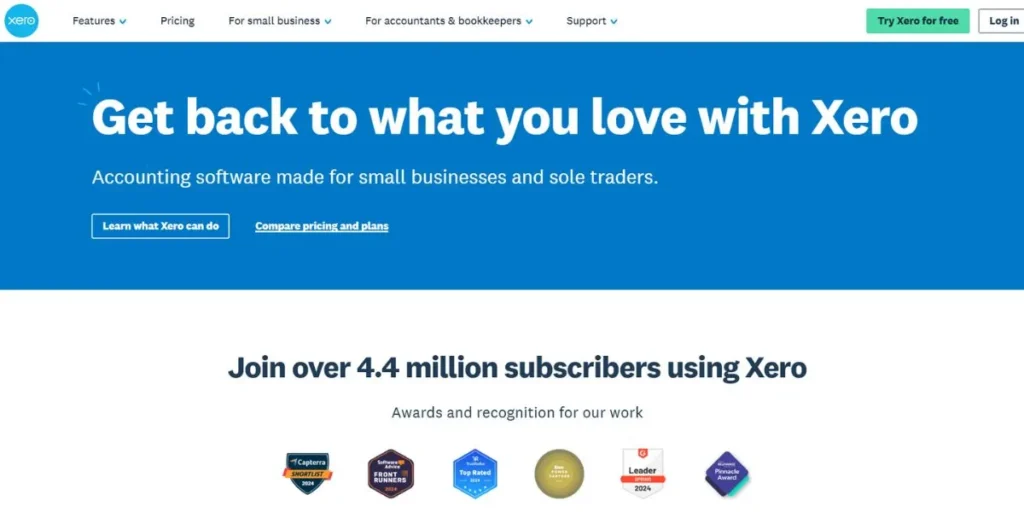
Xero offers cloud-based accounting perfection with splendid multi-entity management, and this is why it is a favorite of contemporary business that needs flexibility and accessibility. Its smooth user interface and the robust automation functions make financial processes simpler in a large number of companies, and audit trails are preserved. The robust mobile app also makes it very appealing to digital-first entrepreneurs and remote teams, as it allows the owners to keep an eye on the whole portfolio no matter their location.
Key Features
- Multi-company dashboard that is cloud based and real time synchronized
- Automated bank reconciliation of all business bodies
- A wide scale of project tracking and profitability reports
- Fine reporting allows customisation of multi-entity consolidated statements
- Complete API to design custom integrations and automations of workflows
Entity Limits: There is no limit on the number of companies that can be managed in a Xero organization
Best For: Businesses that are tech-savvy, consultancies and developing businesses that need mobility
Pricing Info
- Xero Starter: $13 USD/mois (5 factures, 5 factures)
- Xero Standard: $37 a month (unlimited invoices, bills)
- Xero Premium: $70 a month (projects, multi-currency, expenses)
- Other companies: $20 per month per company
3. NetSuite
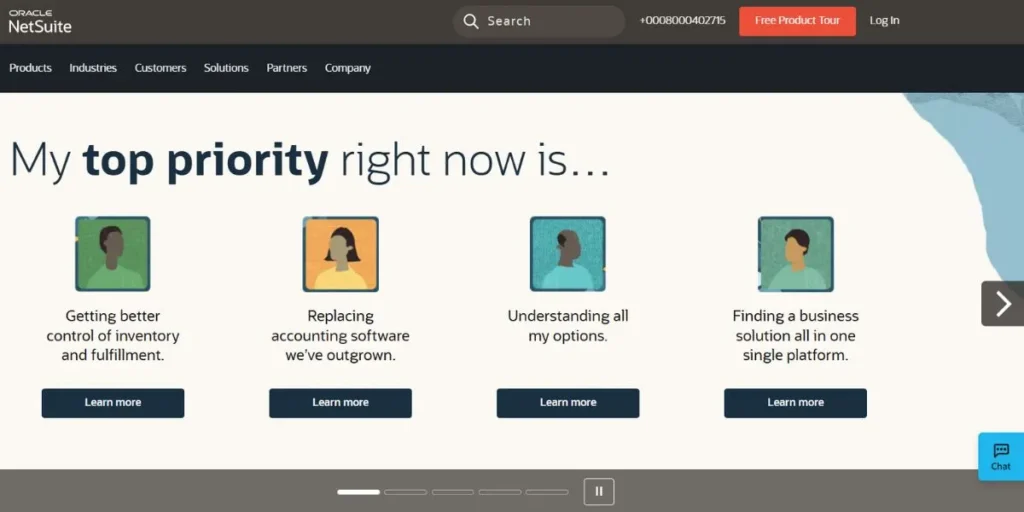
NetSuite is the gold standard of enterprise resource planning and delivers multi-entity management in a totally integrated business suite. It is an accounting, CRM, e-commerce, and inventory management system that is owned by Oracle and can be used all in one system, and is easily scalable with larger and larger business empires. Although more complicated than a simple accounting program, the high degree of customization and advanced capabilities of NetSuite makes it an essential tool to more complex businesses that need to run detailed financial control and reporting.
Key Features
- Full ERP package and multi-entity accounting built-in
- High level and effective combination and eradication skills
- Financial reporting in real time and Business intelligence dashboards
- Multi jurisdictional compliance management Comprehensive compliance management
- Workflows and approval processes that are customizable per entity
Entity Limits: The maximum business entities/subsidiaries to be maintained
Best For: Large enterprises, holding companies and fast growing businesses
Pricing Info
- NetSuite Starter: $99 USD/month (base features)
- NetSuite Mid-Market: Request price NetSuite Mid-Market: Request price
- NetSuite Enterprise: Pricing contact
- The cost of implementation and customization differs a lot
4. FreshBooks
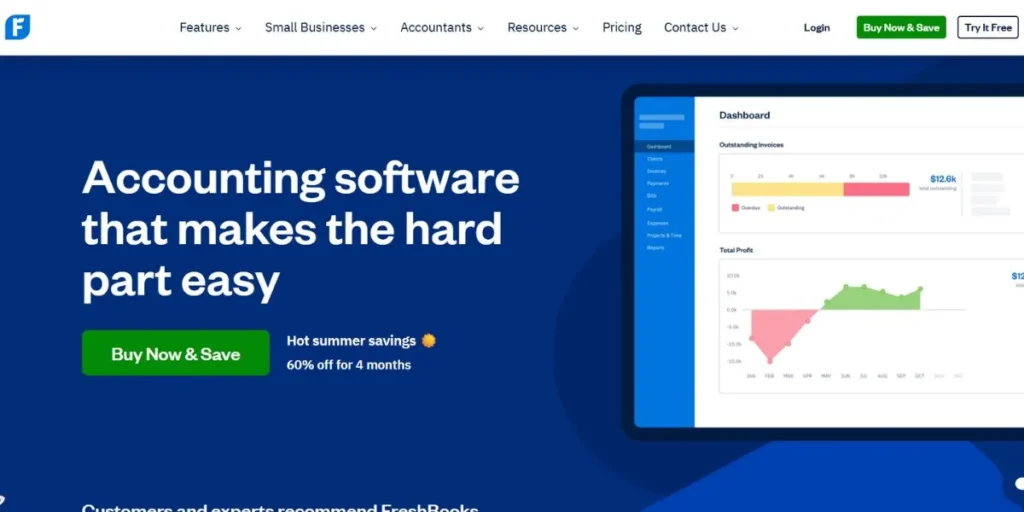
FreshBooks is great when it comes to user-friendly multi-entity accounting tailored to service companies and individuals that run multiple projects. The power of the platform is that it has exemplary time tracking, project management, and client billing options in various business entities. Its user-friendly interface means it can be used successfully even by non-accountants to deal successfully with complex multi-business financial activities, and still be professionally competent in terms of how it deals with clients and how it reports its financial statements.
Key Features
- Client and project management system Multi-business
- Project based billing time tracking
- Customization of invoices in professional manner to various business brands
- Built in cost and income monitoring
- Entity entity branding of client portal access
Entity Limits: The number of businesses supported by each plan is one; other businesses need different subscriptions
Best For: Multiple-business, multiple-line business, services providers, consultants, creative agencies
Pricing Info
- FreshBooks Lite: $17/ month (5 clients)
- FreshBooks Plus: $ 30 /month (50 clients)
- FreshBooks Premium: $55 a month (500 customers)
- FreshBooks Select: Purchase of custom prices
5. Zoho Books
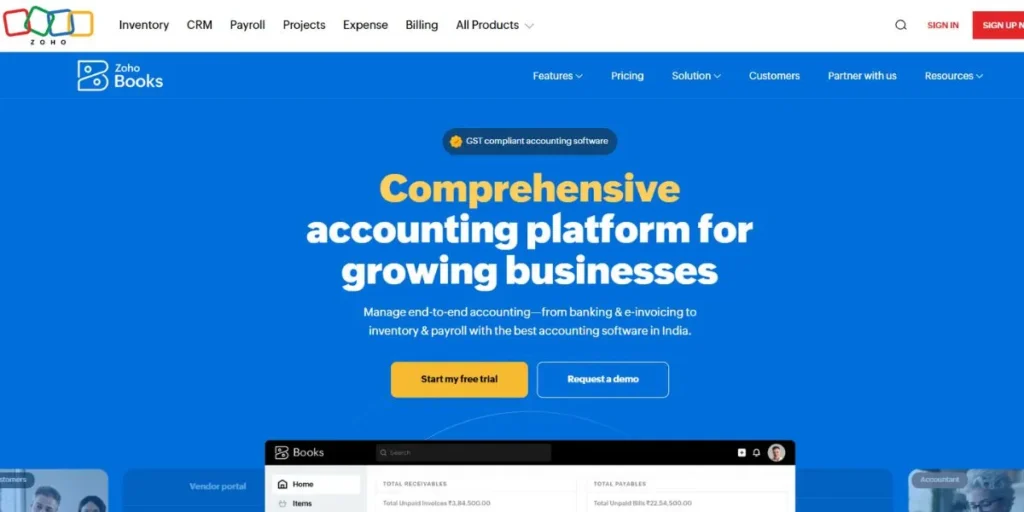
Zoho Books offers full multi-entity accounting functionality as part of the wide Zoho suite of business applications with the benefit of smooth integration with CRM, project management and other business tools. As an accounting software for multiple businesses, the key feature of this platform is the lower price point but still providing enterprise-level features, which is why it is a great option to consider when having multiple businesses. The automation features of the software and the AI-based insights can simplify the financial operations within all entities without losing the fine-grained control over the specific needs of each business.
Key Features
- Multi-organization management in Zoho ecosystem
- Automated generation of a workflow to recurring financial activity
- Expense classification and financial knowledge with artificial intelligence
- Multi-currency and auto update of exchange rates
- Inventory control and Overview of more than one location
Entity Limits: The user can create various organizations within a single Zoho account
Best For: Small businesses, start-ups, and the ones that use the Zoho ecosystem are most recommended.
Pricing Info
- Zoho Books Free:0 /mo (1 user basic features)
- Zoho Books Standard: $20 a month (3 users)
- Zoho Books Professional: $50 a month (10 users)
- Zoho Books Premium: $70 USD/monat (10 Nutzer, weitere Funktionen)
6. Wave
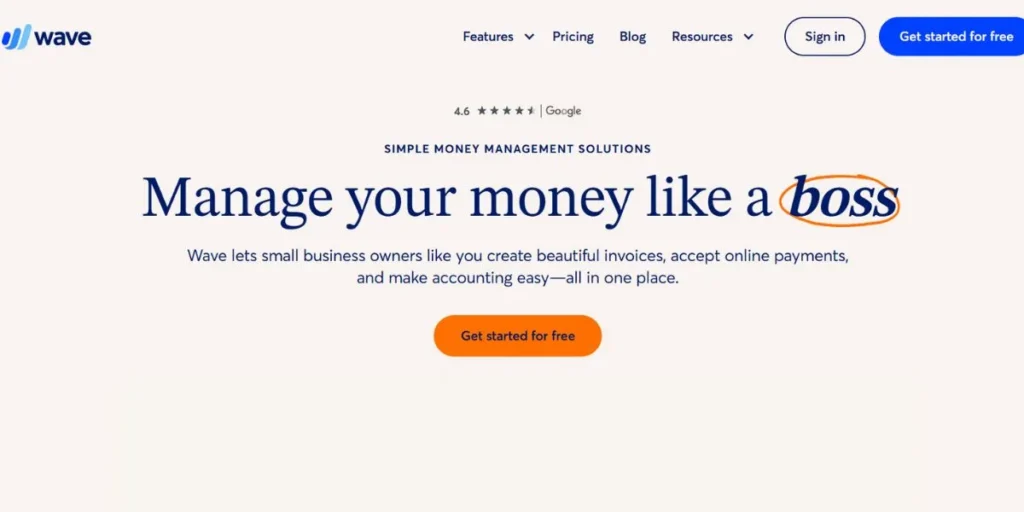
Wave upends small business accounting by providing free core accounting features that can make it a popular choice among entrepreneurs who have a multiplicity of small businesses and need accounting services but have limited budgets to spend. As an accounting software for multiple businesses, Wave is also free and does not skimp on functionality, offering powerful multi-entity management tools that are comparable to paid applications. The platform earns money by charging payment processing fees and payroll services to users and enables them to use the premium features as their business expands without having to pay a fee to use the free accounting base.
Key Features
- Totally free multi-entity accounting and invoicing
- Automated categorization of transactions and synchronization of the bank
- The possibility to draw professional invoices and estimates with branding
- Simple multi entity reporting and financial statements preparation
- The combination of payroll services and payment processing.
Entity Limits: An unlimited number of businesses can be under a single Wave account
Best For: Startups, freelancers and small businesses who have little budgets
Pricing Info
- Wave Accounting: Free (no limit in companies)
- Wave Payments 2.9% based on transaction value of + 0.30
- Wave Payroll: As low as $20 per month and $6 per employee
- Wave Advisors: $149/month for bookkeeping support
7. Sage Intacct
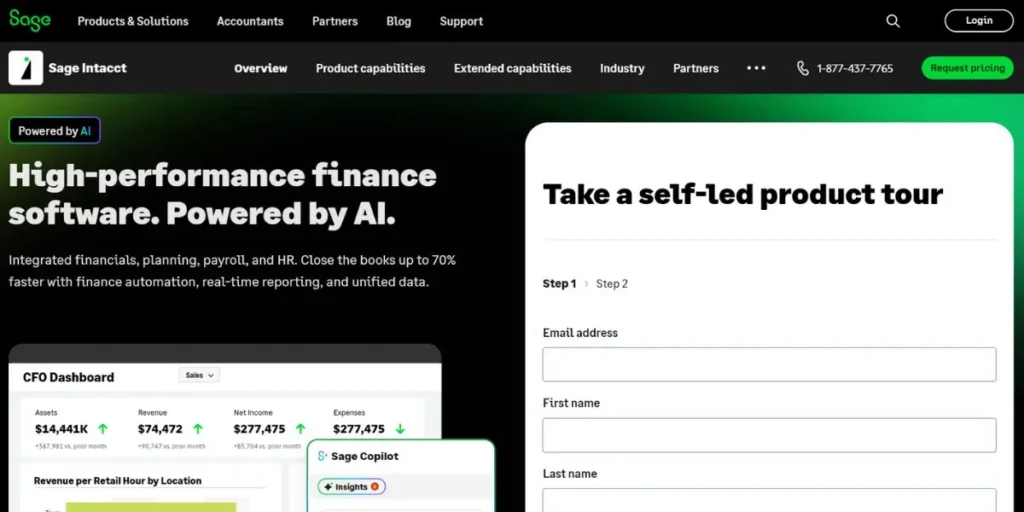
Sage Intacct is the leading cloud financial management solution that delivers built-in multi-entity capabilities and advanced financial reporting tools to mid-market companies requiring sophisticated functionality and multi-entity financial management. Designed to meet the needs of growing businesses, the platform is highly customizable and has a lot of consolidation capabilities that can streamline complex financial processes across businesses. It is also beneficial to businesses in highly regulated industries or those that plan to grow and acquire others significantly.
Key Features
- High-level multi-entity consolidation and elimination
- Multidimensional reporting with no limit of custom segments
- Advanced budgeting and forecasting at entity level
- Market conformity and automated recognition of revenue
- Real-time financial dashboards that can be drilled down to the underlying data
Entity Limits: Entities are not restricted and have detailed consolidation facilities
Best For: Mid-market companies, professional services firms, and regulated industries
Pricing Info
- Sage Intacct bases its prices at about $400/month
- The cost of implementation is between $10,000 and $50,000
- Extra modules and users are accompanied by additional expenses
- Custom pricing based on company size and requirements
8. Acumatica
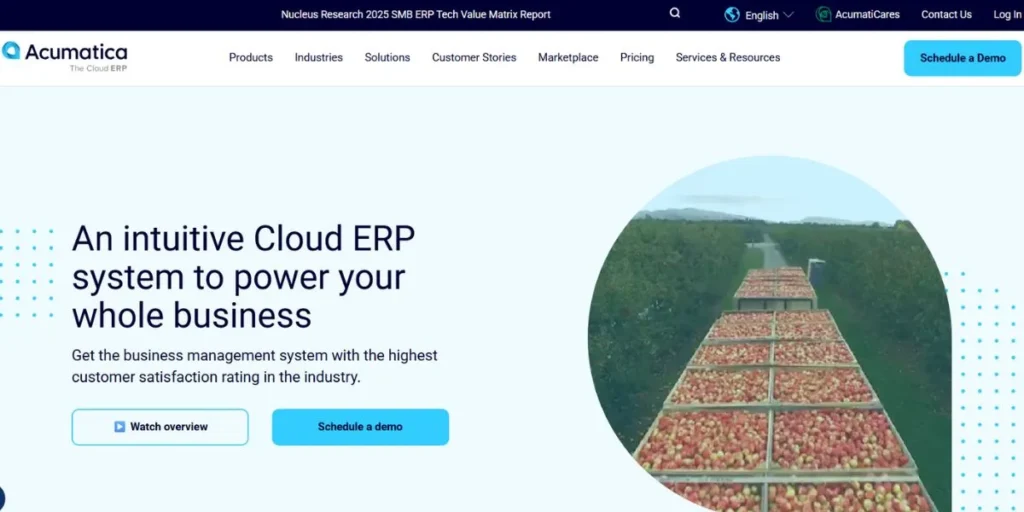
Acumatica is a complete cloud ERP system with an exceptional multi-entity accounting feature that is specifically meant to support businesses that have the need to integrate financial management, distribution, and customer relationship management. As a robust accounting software for multiple businesses, the platform has a different licensing approach: instead of a number of users, the platform charges based on the resource consumption, which makes it affordable to those organizations that have large teams that manage multiple entities. The open architecture and the possibility of a great deal of customization guarantees that the software will fit unique business needs and will be scalable.
Key Features
- Multi-company financial management in an integrated ERP
- Unlimited user licensing regime hinged on consumption of resources
- Project accounting and job costing entity wide
- Audit trail and full compliance
- Mobile-first design Offline
Entity Limits: There are no limits on the number of entities to be used in the ERP framework
Best For: Scale up, mid-market companies and project based organizations and dispersed teams
Pricing Info
- Acumatica Small Business: $1,395/mo (min. user/resources)
- Acumatica Medium Business: $2,695 a month (added extras)
- Acumatica Large Business: $4,695/month (all-inclusive)
- Further add-ons and modules can be had at an additional cost
9. Sage
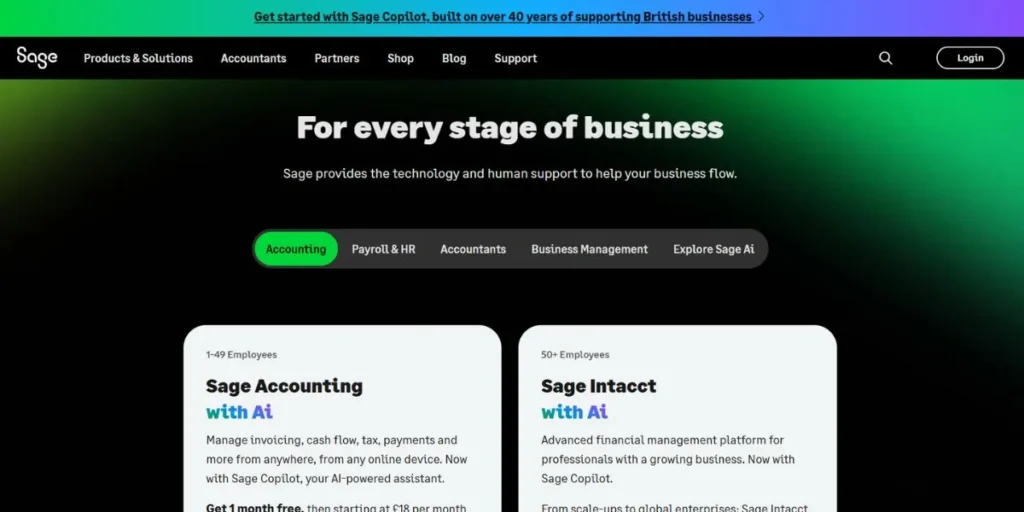
Sage has numerous product lines that cater to businesses of all sizes and Sage 50 and Sage 100 offer powerful multi-entity management to traditional businesses that need on-premise or hybrid cloud solutions. The long reputation of the company in accounting software resonates in mature, stable platforms that can deal with multi-business situations without any problem. Sage is a robust feature-rich software with comprehensive reporting features, which makes it the most suitable software in businesses that require advanced accounting.
Key Features
- Holistic multi-company databases management
- Multi entity advanced job costing and tracking of projects
- Large amounts of customizable reporting and financial statements
- Inventory management that has built-in multi-location capability
- High levels of security and user access privileges
Entity Limits: It is capable of supporting an indefinite number of companies in the capacity of the database
Best For: Existing businesses, manufacturing businesses and companies that require elaborate reporting
Pricing Info
- Sage 50 Pro: $278.98/year (one user)
- Sage 50 Premium: $431.98/yr (max of 5 users)
- Sage 50 Quantum: $1999.98 / year (Up to 30 users)
- Sage 100: Custom prices which start at about $10,000
10. Tipalti
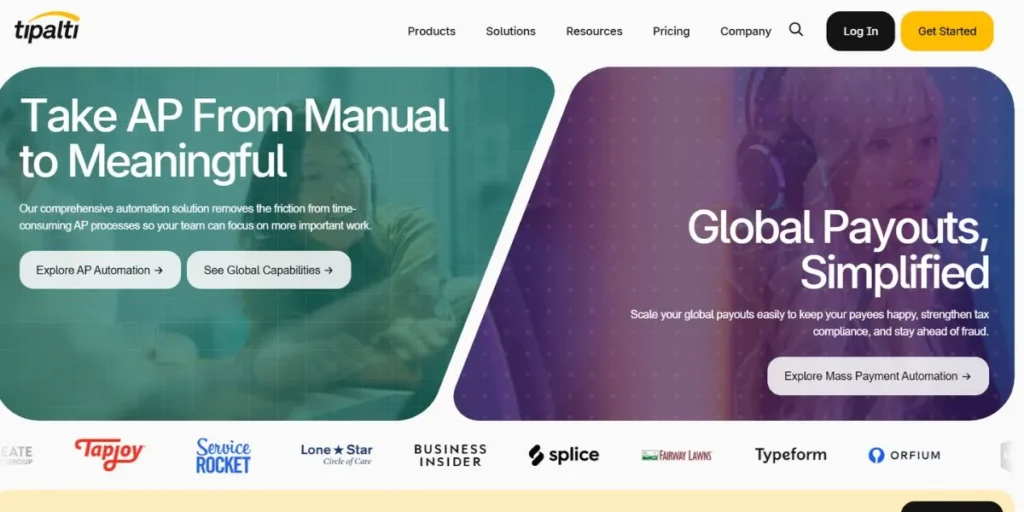
Tipalti is an accounts payable automation and global payments processing company and an outstanding supplement to current accounting software for multiple businesses, especially in companies that have multiple entities with intricate third-party relationships. Although Tipalti is not a full-fledged accounting solution, its versatile automation features help to simplify the process of invoice processing, approvals, and even international payments on behalf of different business units. It has a very useful feature of compliance and tax management that comes in handy to those companies that are international, or those that deal with many vendors.
Key Features
- Multiple entity accounts payable processing Automation
- Multicurrency payments across the globe
- Entity specific routing in advanced approval process
- Tax compliance and reporting end to end automation
- And interface with the big accounting and ERP systems
Entity Limits: Allows the limitless number of entities at a subscription level
Best For: Companies that have a complicated AP operations, off-shore operations and multi-vendor relationship
Pricing Info
- Tipalti Starter: Low-cost AP automation at your own prices
- Custom Features and Pricing Tipalti Professional
- Tipalti Enterprise: All of it, volume-based charges
- There is implementation and setup fee that is usually charged
Best Free or Affordable Options for Startups
- Wave Accounting: offers free multi-entity accounting, with no limit to the number of businesses it can manage, and hence it is ideal to bootstrapped startups that are experimenting with various business ideas.
- Zoho Books: has a free plan with limited functionality that increases cost-effectively with the development of businesses in the Zoho ecosystem.
- QuickBooks Simple Start: brings in professional accounting features at the cost of $30 a month, which is a great investment to single-entity startups that intend to grow.
- The lowest tier plan of Xero: available at a monthly rate of 13 dollars, provides the cloud based flexibility that is most suited to any contemporary startup that needs cloud based accessibility and real-time collaboration.
- FreshBooks Lite: is a time tracking and professional invoicing service-based startup solution that costs only $17 per month.
- Open-source substitutes: such as GnuCash offer totally free options to tech-savvy entrepreneurs who are not afraid of self-managed systems, but they are more technical in nature, and no professional support is available.
Enterprise-Grade Software for Holding Companies
- NetSuite: dominates enterprise multi-entity management with full ERP functionality, powerful consolidation features and unlimited scalability of complex holding company structures.
- Sage Intacct: focuses on advanced financial management with dimensional reporting, automated consolidations, and powerful compliance capabilities that regulated holding companies need.
- Acumatica: It has unlimited user licensing and integrated business processes which makes it economical when it comes to holding companies which have lots of teams to handle various subsidiaries.
- Microsoft Dynamics 365: offers multi-entity functionality at enterprise level with powerful integration to the Office 365 and the Azure cloud services.
- Oracle Cloud ERP: provides top-notch consolidation and reporting functionality to the biggest holding companies with complicated international operations.
- SAP Business One: provides end-to-end enterprise resource planning of multicompanies management which is applicable to the complex holding company needs and international operations.
How to Choose the Right Software for Your Business Structure
- Review your existing business portfolio: by analyzing the number of entities, volume of transactions, and complexity of inter-company relationship to analyse the capabilities required in the software.
- Think about your growth path: and choose solutions that will grow with your business plans without the expensive migrations as your business empire expands.
- Consider technical requirements: this should include integration needs, user access requirements, mobile accessibility so that your software can enable your workflow.
- Total cost of ownership budget: this should not only be the monthly subscription amount but also the cost of licensing, implementation, training and the ongoing support.
- Put compliance first: by using software that helps you comply with any tax reporting, auditing trails and regulatory necessities in all locations where you conduct business.
- Test user experience: do free trials, demos to be sure that the interface of software suits your team technically and is in accordance with its everyday needs.
Conclusion
Choosing an Accounting Software for Multiple Businesses to handle more than one business entity involves a critical thought process concerning your present requirements, expansion strategies, and business complexity. Whether it is Wave with its free solution that works perfectly with startups or NetSuite with its full-fledged enterprise features, both platforms cater to business needs and development phases. The trick is to align software capabilities with your distinctive needs with a view to long-term growth as well as overall cost of ownership.
Whichever route you take, flexibility of cloud or on-premise control, cost-effective simplicity or feature-packed complexity, the best accounting system will make your multi-entity business more streamlined, provide better financial insight, and help you to achieve your entrepreneurial goals as you form and run your business enterprise.
FAQs
Is it possible to run a limitless number of businesses on one single software subscription?
It is software dependent. Wave, Xero and NetSuite allow an unlimited number of entities whereas other applications such as FreshBooks need to be subscribed to individually per business.
What is the most economical way to manage 2-3 small businesses?
Wave provides absolutely free accounting to unlimited businesses, which is why it could be considered a good choice for frugal business owners that deal with many minor enterprises.
Should I open a different bank account per business?
Yes, it is important to have separate bank accounts for each legal entity, as it is required during accounting, legal protection, and tax compliance.
What is the inter-company transaction treatment by enterprise solutions?
Advanced systems such as NetSuite and Sage Intacct automatically monitor and remove inter-company transactions during the process of consolidation.
Is it possible to change the accounting software that I am using as my business expands?
Yes, data migration may be complicated. Select software which is capable of scaling up with your growth in order to reduce the necessity of expensive transitions.

